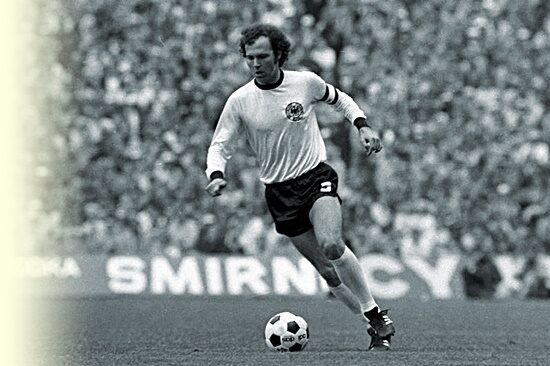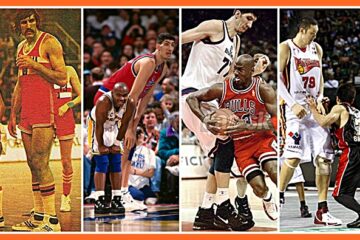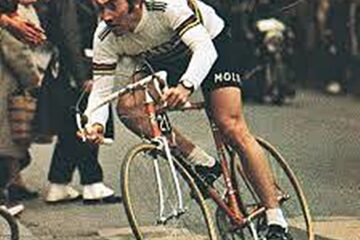Franz Beckenbauer, ‘Der Kaiser’ of World Football!

Franz Beckenbauer (1945-2024)
After Cruyff, Maradona, Pele, B. Charlton, now another iconic player changes his life at the age of 78. Another prominent figure from the pedestal of world football is gone. The senators of the football game, those who revolutionized it, may now be gathered together somewhere in heaven…
In West Germany, “Der Kaiser” undoubtedly revolutionized the position of center back, becoming one of only three people to win the Cup. of the World as a player and coach. Franz Beckenbauer was the defining figure of German football for more than half a century and without a doubt an icon of the world. He had a long and distinguished career full of trophies.
Franz Anton Beckenbauer was born in September 1945 to Franz and Antonie Beckenbauer in Giesing, a working-class suburb of Munich, near what would become the site of the city’s Olympic Stadium. His father was a postal worker. Franz was identified as a player of rare talent as a child by both of the city’s professional teams, 1860 Munich and Bayern Munich. His decision to play for Bayern became the moment when the fate of the team was decided. Without Beckenbauer, Bayern “would never have become the club it is today”, as the eternal German champion said in a statement of his own. Originally a midfielder, Beckenbauer spent most of his career as a “libero”, effectively a deep sweeper, who was given license to get forward and launch attacks whenever the opportunity arose. “For me, he was the best player in German history,” said the current coach of the German national team, Julian Nagelsmann. “His interpretation of the libero role changed the game. This role and his “friendship” with the ball made him a free man. Franz Beckenbauer was able to swim on the lawn. As a footballer, and later as a coach, he was sublime. Stayed on top of things.” Beckenbauer made more than 500 appearances for Bayern – and a further 103 for West Germany – before announcing his decision to quit football and join the Cosmos in 1977. It was a decision that cost him his place at the 1978 World Cup, when the German Football Association decreed that it would not select players who are active outside of Europe.

But Beckenbauer did not relent. He would later describe his years with the Cosmos – in which he had Pele among his teammates – as the best of his life. In Munich, he would say, he could not go for a meal without “the papers reporting my main course”. New York’s cosmopolitanism, on the other hand, offered a degree of freedom. “In Munich, we were all German players,” he would continue. “At Cosmos, there were 14 nationalities, and Pelé.” However, anonymity was only relative. Beckenbauer had withdrawn from the public eye in recent years, hit by the loss of one of his five children, Stephan, to a brain tumor in 2015 and also a year later from heart surgery.
Health problems made “Der Kaiser” change his life on January 7, 2024. He will always be remembered as a defender of unusual balance and elegance. As a coach, with more skill in the selection of players, an executive, also showing himself as a diplomat. He, among many other skills he possessed, knew how to find the way to the net often. Above all, though, Beckenbauer was a winner. As for the headlines, he was “relentless” at Bayern Munich, the club he joined as a teenager and with whom he became so involved that Uli Hoeness, its long-time president, called him “the greatest personality”. in the history of the club. In more than 14 years with Bayern, Beckenbauer lifted four championships, four German Cups, three European Cups and one Intercontinental Cup, the precursor to the Club World Cup.

He was twice chosen “Golden Ball”, the prestigious award given by “France Football” magazine for the European Player of the Year. He remains the only defender to have won it more than once. He went on to win three more titles during a spell, in the fall of his career, with the New York Cosmos.
Even more obvious, he also won with the Nationalmannschaft! In charge of West Germany in the 1966 World Cup final, he lost in extra time to hosts England in a game he felt he was “too young” to influence, as he put it. Four years later, he was part of the West Germany side that lost to Italy in a thrilling semi-final dubbed the “Game of the Century”.


In 1974, two years after winning the European Championship (1972 vs. BS 3-0), “Der Kaiser” finally conquered the game’s global summit, leading FR.GJ to a 2-1 victory against the magical Netherlands in Kruijf-t, in Munich. As captain, Beckenbauer became the first player to lift the current incarnation of the FIFA World Cup trophy. 

He would win that trophy again 16 years later in v. 1990. Beckenbauer had accepted, albeit with some reluctance, to coach the West German national team in 1984, agreeing to take the job only because he felt what he later described as a “moral obligation”. He reached the World Cup final two years later (1986) losing 3-2 to Diego Maradona and Argentina – and then got his revenge in 1990, beating the same opposition by a single goal in Rome in the final. 
By achieving this, Beckenbauer secured his place in an exclusive group of only three people in world football who have won the World Cup as a player and coach. Even after ending his direct involvement with football, on the field, he continued to win. Beckenbauer was at the forefront of a reunified Germany bid to host the 2006 World Cup. Throughout his career, his private life and behavior as an executive player led to reputational damage and more than one brush with the law: both his tax affairs and romantic life attracted attention and, in the case of the former, seven-figure fines were levied. “He did everything a German shouldn’t do,” his former teammate Paul Breitner once said. “He got divorced, left his children, ran away with his girlfriend, got into trouble with the tax collectors, left his girlfriend again. But he is forgiven for everything, because he has a good heart, he is a positive person and he is always ready to help.
And Franz in the end does not hide his weaknesses, does not sweep his mistakes under the carpet.” Allegations of corruption related to the bidding process for the 2006 World Cup, however, were not so easily forgiven. A decade on from his role as the hero of that tournament, Beckenbauer avoided criminal punishment in Switzerland, home of soccer’s governing body FIFA, only when a trial was abandoned shortly before the verdict was handed down because of a Swiss rule about with the amount of time. that had passed since a fault or crime is alleged to have been committed. Beckenbauer has always denied the allegations. “We didn’t want to corrupt anyone and we didn’t bribe anyone,” he wrote in a column for German newspaper Bild in 2016. That trial came years after Beckenbauer took part in the tainted FIFA vote that led to the awarding of the tournament of 2018 and 2022 for Russia and Qatar. Beckenbauer was among the officials accused of wrongdoing.
By Pjerin Bj January 7, 2024
_____________________
Sports Vision + / The Hour of The Champions in activity since 2013
Discover more from Sports Vision +
Subscribe to get the latest posts sent to your email.













